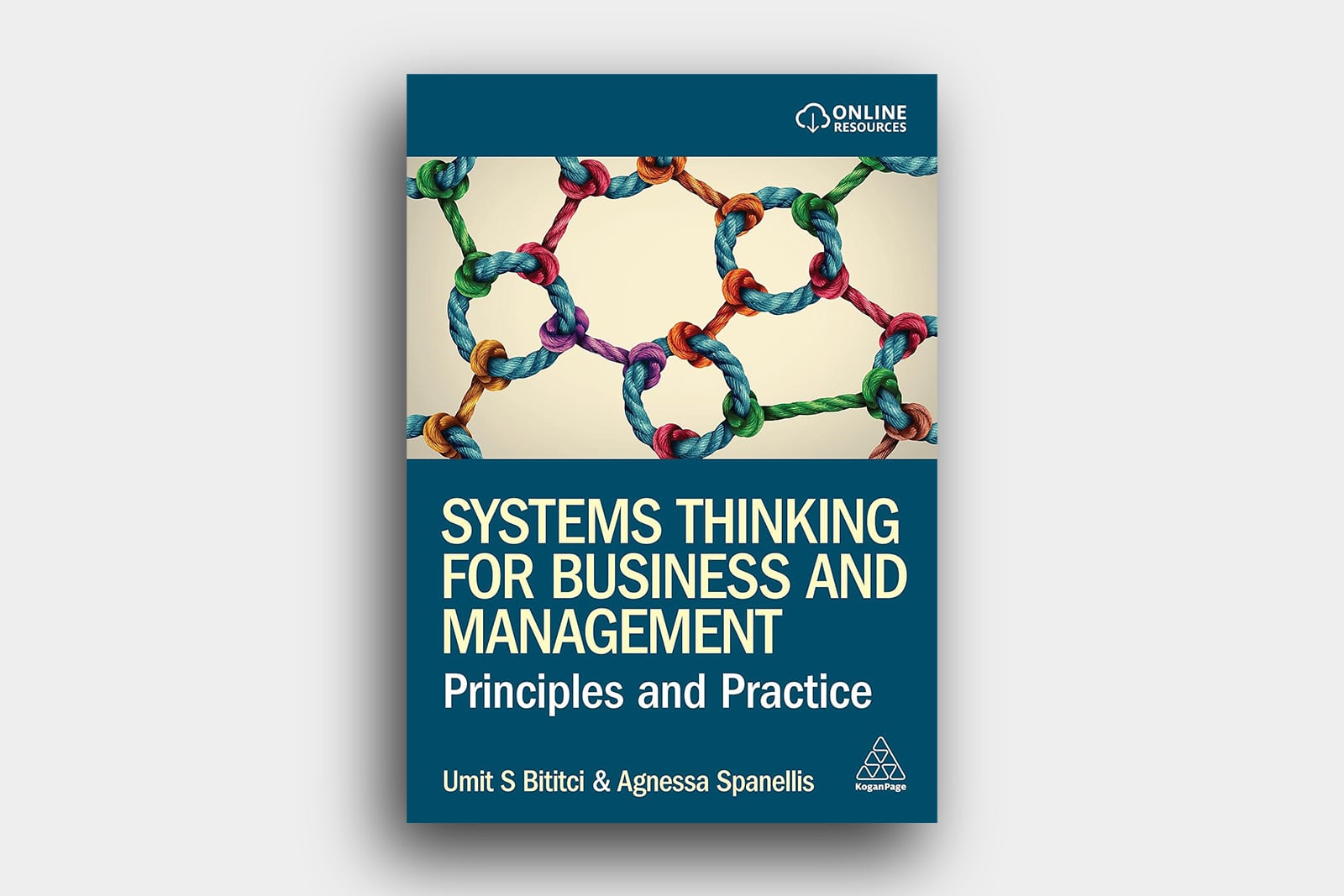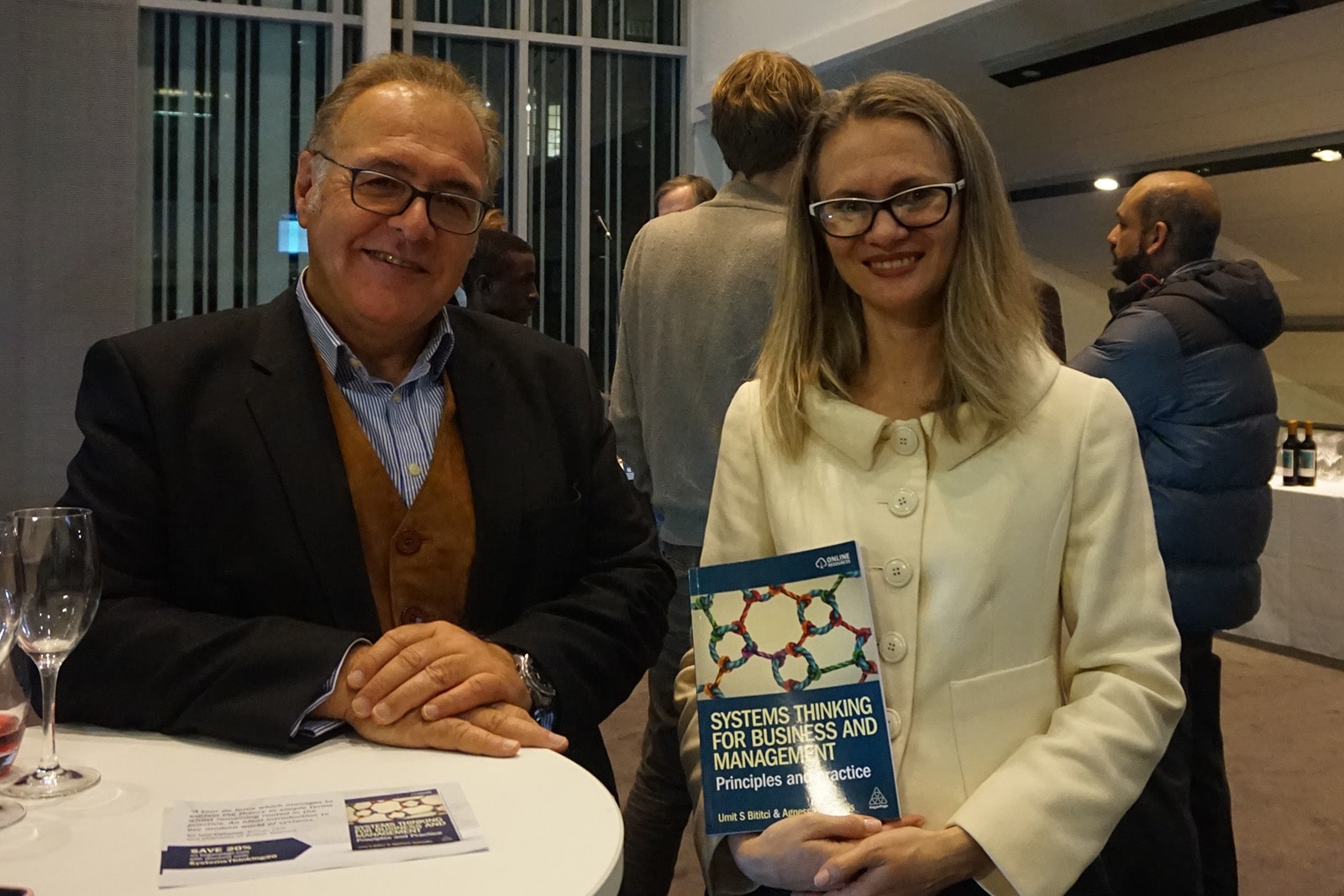
Systems Thinking for Business and Management was co-authored by Professor Umit Bititci from Heriot-Watt University, and Senior Lecturer in Systems Thinking at the University of Edinburgh Business School, Dr Agnessa Spanellis. The event was attended by over 40 guests from academia, industry and government, and the feedback on the presentation was overwhelmingly positive.
During a short presentation, the authors discussed why systems thinking is important in the modern world, what is different about the business and management context, and what is unique about the book. The audience then discussed with the authors how to move from systems thinking to systems doing and why kids should be taught about thinking in systems at school.
Why is systems thinking important?
The answer is simple, it makes us better people. Understanding complexity is really important. And Systems Thinking is about understanding how different parts of a system interact with each other. When we talk about human centred systems, like organisations, societies, families, things like that are very difficult to predict. You might have had the experience in your life at some point, you said, I'll do this, they'll like it. And they didn't like it. And then you get surprised. Or maybe you did something, you were expecting one thing, and you were surprised with a much better result. That's because you didn't understand that complexity. But another thing that creates that complexity is that people have different worldviews. Everybody looks at the world slightly differently. System thinking helps us understand that complexity. But how does it make us a better person? Because you understand that certain things happen that you don't have control over, you get less frustrated, you are more prone to understanding why people around you, your colleagues, people who work for you, your bosses, do the things they do that might frustrate you.
Complexity comes from the interconnections between different parts of the world, different parts of the system, different systems. And we also see grand challenges that we are to face as a humanity in the future. We see how interconnected the world is through the problems that start at one place and cascade into a different one, for example, during the financial crisis and more recently during the pandemic. And we will see more of those in the future. And we believe that with the systems thinking, we are able to at least begin to understand the complexity and try to see how these problems can be addressed, so that we are not fixing a problem in one place and causing more problems in other places.
There are many books on systems thinking. What is unique about your book?
There are lots of books out there. We think our book is unique because it helps you build understanding of systems thinking from the very start gradually to the point where you can actually get some value from applying the methods and models to particular problems. It's deep enough for you to really start applying it but it doesn't overwhelm you with lots of technicalities. After reading the book, you are not going to become an expert in systems thinking, but you will know it well enough for you to be able to apply it.
When I started a systems thinking course, I thought I'd just find the book on it. But there are books on systems thinking that are really specialist with lots of technical detail, and those that are quite superficial. So I ended up building the course over the years in small steps. I think this book covers this space in a unique way. Starting from the basic concepts, and then starting taking you through some really practical examples to help you build models of systems. And we engage with things like the MIT's En-ROADS simulator with some exercises where you need to go to the simulator and do things. And that really helps you develop understanding of systems thinking.
Your book is mainly set in a business and management context. What is particular about systems thinking and Business and Management?
Systems thinking is useful to engineering, there are quite a lot of methods that are tailored particularly to hard systems. If we look at organisation, business, society more broadly, of course, we have processes that will have infrastructure and lots of other components that are part of our system. But first and foremost, we have people. And we think in this book we offer a nice blend of applying both hard and soft systems thinking to try and understand organisations better.
I've seen managers at odds with each other. They say, he's a really nice guy socially. But I find that really difficult to working with him. And then as an outsider, when you work with them for a while, you could just see that they look at the world differently. They've been brought up differently, their education is different. Their jobs are different. One is a marketing person, the other one is a hardcore operations management person. So they will clash in a number of different ways. Organisations are networks of people who come together for a particular purpose. It's like this that different parts of the really volatile unpredictable system coming together thus create complexities. The most complex systems we are dealing with are actual organisations or management organisations.
How do we move over to systems doing? What is the biggest hurdle to that? And what is the answer to that, apart from it's in the book?
My first suggestion is to try and bring people together to focus on action-oriented problem solving, rather than just focusing on the problem itself. If you're trying to give people a direction, that yes, there is a problem, let’s discuss it, but let's also focus on how we're going to solve this problem. If you try to develop a shared understanding of this problem, so that people bring in different perspectives and try to find common ground, this quite often becomes the first step to trying to solve this problem.
That's a tough question because it's not easy to practice systems thinking. It's not like management intervention. You can do Lean because you can build a process map, identify what's adding value, you can actually do that. Systems thinking is more conceptual. But then, once you people start to start seeing the benefit it and more people start thinking in systems, the implementation will be more organic. Jim Mather, the former Scottish Minister for Energy, Enterprise and Tourism, was and still is a funnel of systems thinking. And when you first started talking about systems thinking, people in the Scottish Government used to look at him as if he just landed from Mars, because it was seen this wacky thing. It's no longer. Systems Thinking is becoming a common approach within the government policy. It is building that critical mass.
You mentioned Jim Mather. And he has frequently mentioned to me that he at one point considered you the most dangerous man in Scotland for suggesting that systems thinking should be introduced in every primary school. Now, I don't know how realistic it is, but how early in the curriculum do you think we can get Systems Thinking being discussed, and promoted?
I think I just said that slightly differently. It's interesting that people come out of universities, and then they go on to courses to learn about systems theory. To go back to what I said, the belief I have is that it's a life skill. So why don't we teach kids systems thinking. That doesn't mean you need to go in a classroom and say, this is systems thinking. You can help them teach in systems, whatever you are doing. You teach the way you question them, the way you support them. They will come out at the end as systems thinkers and that's what I was trying to say.


